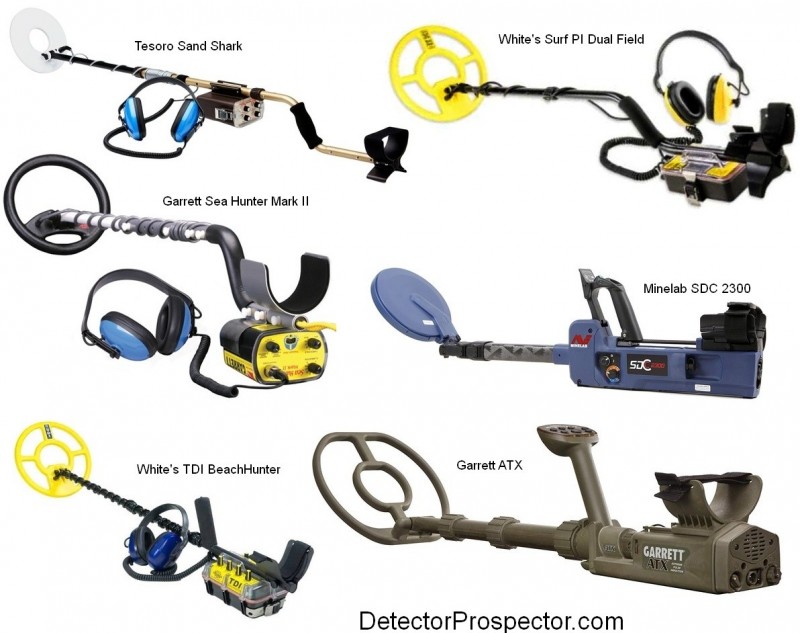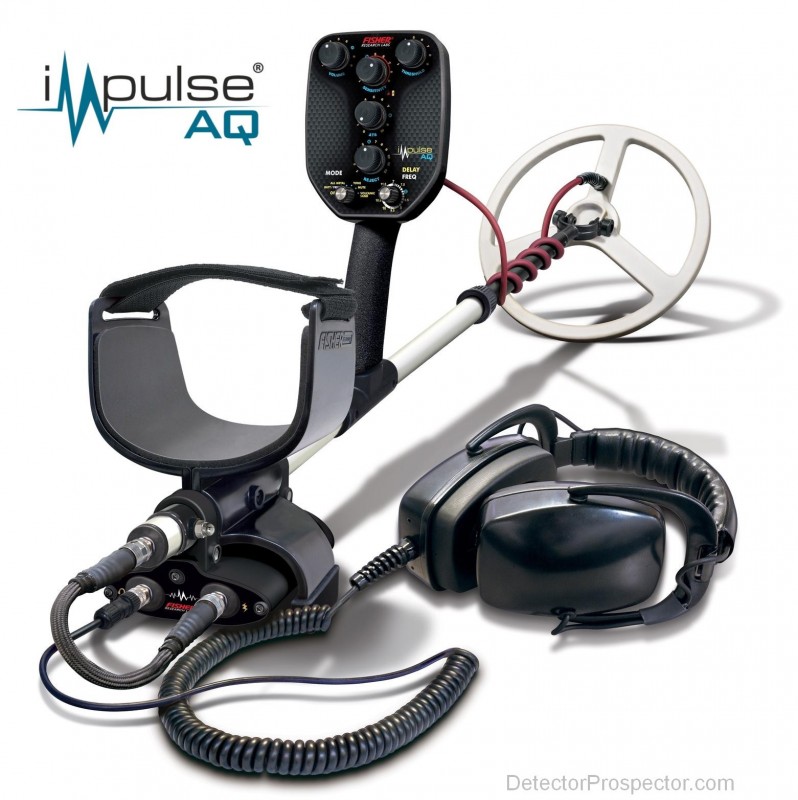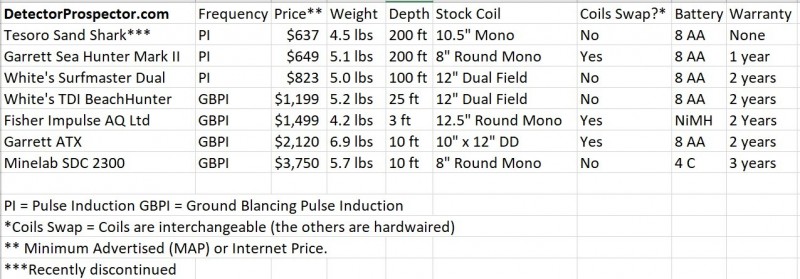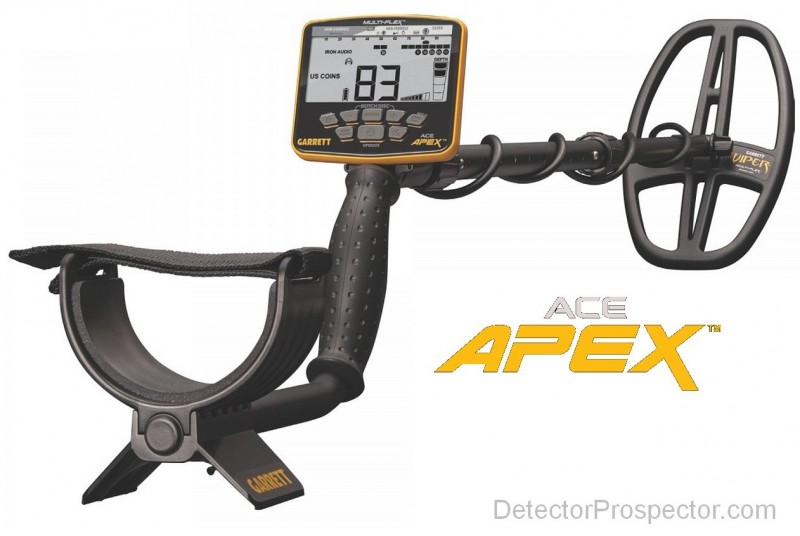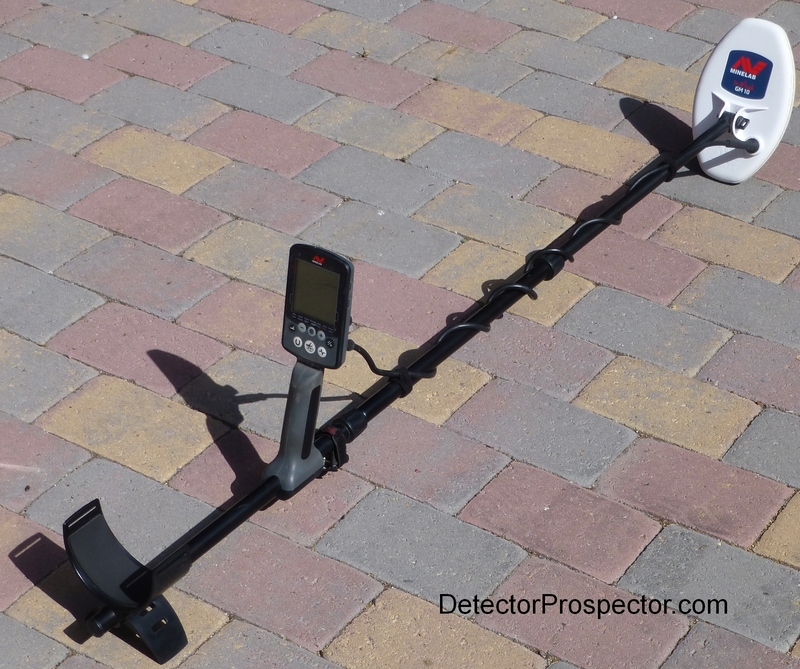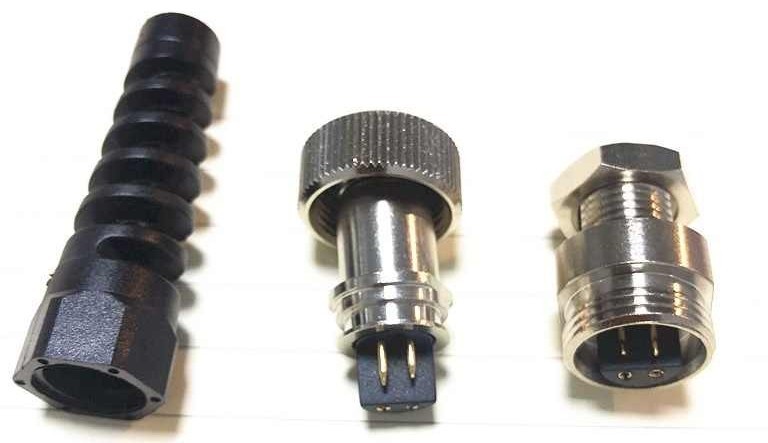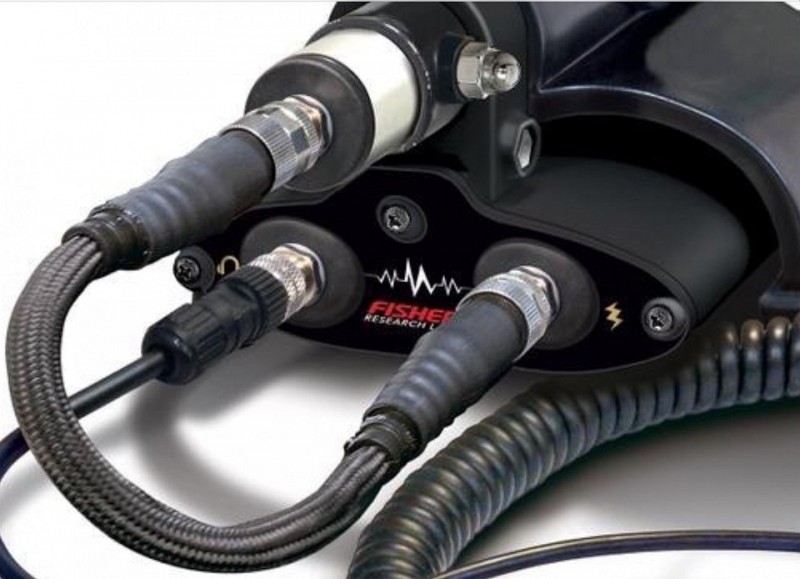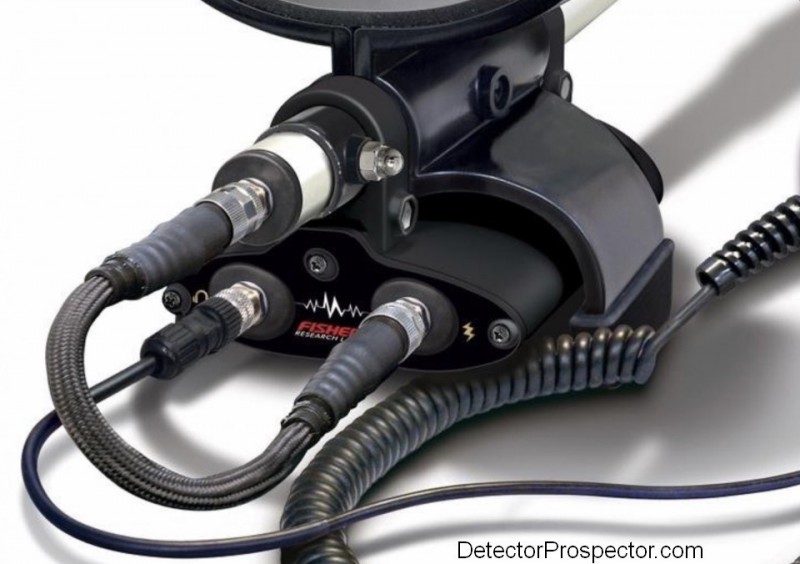-
Posts
19,756 -
Joined
Content Type
Forums
Detector Prospector Home
Detector Database
Downloads
Everything posted by Steve Herschbach
-
Some short personal opinions: Garrett Sea Hunter Mark II - Well proven detector waterproof to 250 feet, optional coils, killer price. It is on the heavy side but it can be hip mounted. The only real downside is that as a non-ground balancing PI it can react to black sands and hot rocks. But for normal beach detecting I'd recommend the Sea Hunter for somebody wanting a non-ground balancing PI. It's a real bargain at $649 and with interchangeable coils. Garrett ATX - Ground balancing PI in industrial strength housing. White's TDI Beachhunter has a saltwater beach edge with it's "ground balance off" setting. ATX is the better of the two if ground balance is engaged. The ATX is a dual channel PI whereas the TDI is a single channel PI, which means there is a huge "hole" near the ground balance setting where gold in the 1/4 ounce range is very weak. This also means the ATX is the better prospecting machine. The ATX is expensive, heavy, and suffers from coil cable and rod issues with exposure to sand and saltwater. I did well with the ATX on the beach but that was before the TDI Beachhunter came out. I'd now recommend the TDI instead unless you really needed the coil options. Fisher Impulse AQ - New model promises light weight and superior performance with ground balance on or off. All is speculation until more is known, but unless you need a waterproof PI detector right now, wait a bit for this one. Minelab SDC 2300 - Looks good on paper. Extremely sensitive to small items for a PI, and therefore superb on small gold nuggets. But in water it floats like a cork, and it is very expensive. Waterproof integrity is worrisome for such an expensive detector. The hardwired 8" mono limits ground coverage on large beaches. As a result you won't see many of these at the beach. Tesoro Sand Shark - Was not a bad unit but with Tesoro out of business - stay away. White's Surfmaster Dual Field - Excellent non-ground balancing PI, solid performer, easy to operate. A lighter weight alternative to the Sea Hunter above, but also more expensive and with a hardwired coil. Note that the Surfmaster does have twice the warranty of the Sea Hunter. White's TDI BeachHunter - Good performance in ground balance off mode, top notch if battery replaced with higher voltage option (see White's Forum). Good ground balance option but does have a weakness on certain heavy gold rings. The weakness goes away in the ground balance is turned off. For $1199 this is really the only decent proven option in a waterproof ground balancing PI at the moment until more is known about the Impulse AQ.
-
The waterproof pulse induction field is very limited at this time. It divides into two classes. Pulse induction metal detectors that ground balance, and those that do not. A pulse induction (PI) detector by its nature tends to ignore mineralization, so much so that in milder conditions a PI works fine without a ground balance circuit. As I noted above however a PI is not immune to mineralization. A non-ground balancing PI detector will sound off when raised and lowered over true black sands. The more concentrated the magnetite, the more intense these signals will be. The bottom line is that on real bad black sand beaches even a basic pulse induction will sound off if the coil height is varied too rapidly over the beach. In the water with troughs and depressions false signals are all but impossible to avoid. The most extreme situations require a ground balancing pulse induction (GBPI) metal detector. Pure white non-magnetic coral beaches - most any detector will work well Even a hint of mineralization - a multifrequency detector has an edge over single frequency VLF where there are both saltwater and magnetic minerals. Moderate mineralization - you want multifrequency or pulse induction. Severe mineralization - at some point a ground balancing PI (GBPI) is required. The above conditions grade from one into the other seamlessly. Hot rocks are a wild card as hot rocks in a normally mild beach can cause false signals on a PI detector that lacks ground balancing capability. Finally, I should note that PI detectors with ground balancing capability have a crude sort of tone discrimination that can be used to advantage. Fully submersible pulse induction metal detectors Here are the current mainline waterproof PI detector offerings: Bounty Hunter - no PI Garrett - Sea Hunter Mark II (PI) and ATX (GBPI) Fisher - Impulse AQ Minelab - SDC 2300 (GBPI) Nokta/Makro - no PI Teknetics - no PI Tesoro - Sand Shark (PI) (Discontinued) White's - Surfmaster Dual Field (PI) and TDI BeachHunter (GBPI) XP - No PI Finally, here are the key specifications for comparison: Fully submersible pulse induction metal detectors
-
Nice analysis/review Gerry. The only area we disagree on is price. This will never be a high volume machine like Equinox. More like a high end niche item. Assuming it has more depth than any other beach PI, and better disc than any other beach PI.... why would it be a bargain price? If it makes a beach that a CTX 3030 and TDI Beachhunter has cleaned out start producing again... people will pay well for that capability. It’s really only the waterproof rating holding the price down in my opinion. However, in keeping with my under 4 lb, under $2K challenge I want the machine coming in under $2000 regardless of what it can do. I’ll always lobby for more power at lower prices, and on that we do agree!
-

3.7 Ounce Silver Bracelet (watch Band)
Steve Herschbach replied to mn90403's topic in Metal Detecting For Jewelry
Wow, that’s a chunk of silver! Gotta find a lot of dimes to equal that. -

First Gold Chain Ever!
Steve Herschbach replied to Againstmywill's topic in Metal Detecting For Jewelry
Excellent job with the find but even more so in not damaging it while recovering it. Congratulations! -

What Can The Impulse AQ Do?
Steve Herschbach replied to EL NINO77's topic in First Texas - Bounty Hunter, Fisher & Teknetics
All I need is depth on a gold ring that is clearly as good or better than that delivered by a TDI Beachhunter or Garrett ATX and I’ll be happy. Can’t be a step backwards. Be best if it was better than either, and not in a way that is debatable. I hate those hair splitting videos where people say they think that maybe if they listen hard enough they can tell a difference. It would be good to see this detector find a ring the other two detectors can not find at all. Pure, simple, this detector can find this, these detectors can not. I am sure we will see videos and depth comparisons and such as soon as Fisher starts putting some of these in users hands. Right now all we really have is one mystery user. -

Okay Garrett I Know It’s Got To Be A Video
Steve Herschbach replied to Ridge Runner's topic in Garrett Metal Detectors
Don’t be feeding the trolls Chase! The line after next did, so Chuck is forgiven. Be nice to us old folks! -

Whites Dfx..... Should I Buy?
Steve Herschbach replied to Jeff McClendon's topic in White's Metal Detectors
Well, that’s a good enough reason to get one right there! Get the right buy, you can sell it for what you paid for it or more so it’s not really like it costs money to play. -

Whites Dfx..... Should I Buy?
Steve Herschbach replied to Jeff McClendon's topic in White's Metal Detectors
I’ve used the DFX and Bigfoot combo here before and it works great. I’m hunting jewelry and depth is not my main concern. In fact I only use a screwdriver so if the target is beyond reach of my pinpointer I pass it up. The Bigfoot triples the 22.5 kHz frequency target id responses. It throws everything midrange and up into ferrous (ferrous wrap). There are some tricks that might be played with that, especially with the super expanded low conductive range, but in general it just messes with the responses. It runs more reliably in 7.5 kHz single frequency. The ground balance does not work as well either, and even in single frequency and lower gain I get chatter. I can use it in an acceptable fashion, but the bottom line is the DFX just runs the coil in a far more stable fashion, and I can stay in multi with good results. -

Low Weighted Multi Vs 5/10 Khz To Avoid Tiny Targets
Steve Herschbach replied to Argyris's topic in Minelab Equinox Forum
Just a reminder - beach modes are not just for beaches, no more than park is for parks and field is for fields. Put the names aside and just try things without letting the names create misconceptions. In parks I often deal with shallow stuff like can slaw and foil by using the DD tendency to triple signal on shallow stuff. Quite musical in wide open 50 tones! It is risky passing up shallow stuff, but I’ve been known to do it anyway. Good luck! -
Just a reminder - modifying the Impulse in any way and hooking up homemade batteries and cables could very well void the warranty. Just saying. Frankly, if I get an Impulse I just want to get it with a spare battery, and keep it as pristine as possible. But if anyone gets one and wants to sell it later... contact me. I'd have no problems getting a second hand Impulse (no warranty) to use as a sacrificial lamb.
-

Best Detector Values Under $500
Steve Herschbach replied to Steve Herschbach's topic in Metal Detector Advice & Comparisons
It can't possibly know the difference. -
According to Willy the problem is not the pod or battery case themselves: "When you put your hands on this unit, you should not attempt any opening of the enclosure nor the battery pod, they are completely sealed with hard EPOXY. This guarantees their water-tightness. If anyone would insist doing it, there are very good chances that some non repairable damage will occur." (Emphasis added) So the battery and pod are epoxy filled, pretty much bullet proof. The Impulse however employs M8 connectors (see link above) for the battery (4 pin) and headphones (3 pin). M8 connectors are rated at IP67 or IP68 at best. IP67 means the unit can be dropped into a body of water up to a meter deep for half an hour, while IP68 guarantees protection in water up to 1.5m deep for the same period of time. Both are resistant to dust. So there is the problem. Fisher is testing for and stretching that to 4 hours. I guess a battery good for 4 - 5 hours is a not a bad idea... better get your ass out of the water by then! Even a 6 hour day at three feet will exceed what Fisher is testing for. It appears Minelab is employing 8 pin M12 connectors on its coils, also IP67/IP68 rated, and claiming the Equinox is good to ten feet. White’s also appears to be using the 8 pin M12 connector on their 10 foot rated models. So these connectors probably have a large safety factor built in that Fisher and even more so Minelab/White's are taking advantage of. The big difference here - coils versus power cables. If water gets into that Equinox or White’s coil connector, it is unlikely anything will happen. Maybe some pin corrosion at worst. The Impulse power cable is carrying a lot more current. A lot more. Leakage there would be a much larger issue, and in saltwater in particular could create an immediate short and damage. I am not suggesting M12 connectors are any better than M8 connectors. They have the same IP rating. I’m just pointing out that Minelab and White’s are utilizing them. I’d rather see something like the Garrett PI connectors, which are good to 200 feet, but unfortunately they are proprietary and almost impossible to source by themselves. Long story short, be super extra careful about properly seating and snugging that battery cable, and protecting it from damage. I’m a little less worried about it personally as mine will be in fresh water way before it ever sees saltwater and will therefore get tested at length in a less risky environment before ever proceeding to saltwater. It is too bad there is no way to charge the battery without disconnecting the cable. For saltwater use it might be worth considering sealing the detector end of the cable semipermanently to the detector. This would reduce the risk of a battery connector leak by 50%. The headphone connector, like coil connectors, would be of less concern. A possible solution to this issue exists in the form of a DIY battery and cable replacement project.
-

Low Weighted Multi Vs 5/10 Khz To Avoid Tiny Targets
Steve Herschbach replied to Argyris's topic in Minelab Equinox Forum
Why no mention of Beach 2? It is salt compensated, and therefore will automatically eliminate low conductivity targets. But yeah, Park 1, 5 kHz is another option. Generally tiny targets that read high are relatively rare. When I hunted in the UK I was knocking out target id 6 and lower to eliminate small targets, but still got little copper and brass bits that read up in the teens. Again however, they were not so common as to be more than an annoyance. -
Well I hope there is a version at some point that is promised as waterproof to at least 10 feet or even more. Even a unit waterproof to 1 meter may be used deeper. There are brave people using the CTX 3030, rated to ten feet, to much greater depths scuba diving. They use extra care to secure possible leak areas, and go for it, with success. Where there is a will there is a way, and making a detector that is waterproof to 1 meter work to three meters would not be impossible for some intrepid forum members. But it would be entirely at their own risk.
-

At Any Pictures Gold Nuggets
Steve Herschbach replied to rasheede11's topic in Detector Prospector Forum
Anything is possible. The best indicator would be if anyone has found gold in these locations before. If not, nobody knows for sure. If I was with you and I had a GPZ 7000 with me, I would ask you to let me detect at least a couple hours at each location, or better yet a full day at each location. I personally like a mix of dark and light material so prefer the first three pictures, but nothing would stop me detecting in each picture just based on what I see. The beauty of metal detectors is they make it easier to try than wonder. There is an old saying, gold is where you find it. I have seen locations where everything indicates there should be gold but none is found. And locations where gold should not be found... but somebody did. Geology can point the way, but the ultimate decider is sampling, and metal detecting is a quick, easy way to sample for surface indications of gold. Not finding gold with a metal detector does not mean there is no gold. Other methods may reveal gold metal detectors miss. But they can work successfully in some locations, and are simple and affordable enough that most of us can acquire and learn to use one effectively. Good luck!

